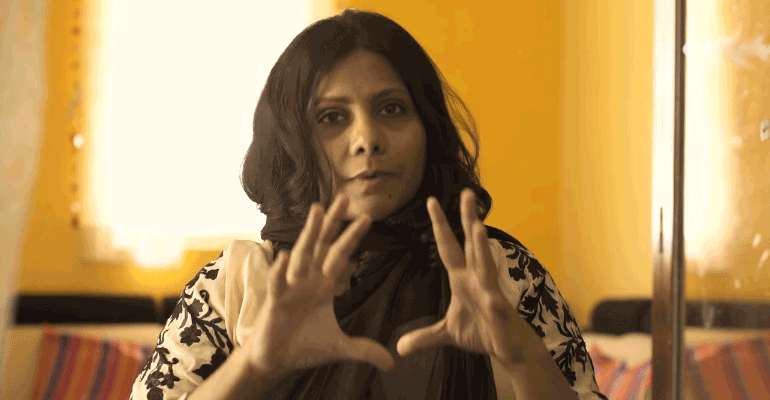An exceptional judgment, pronounced by a single judge Justice Pushpa Ganediwala of Nagpur bench at the Bombay High court on 24th January, dropped the charges of ‘sexual assault’ under the POCSO Act against a man for pressing the breasts of a 12-year-old.
Reportedly, the testimony of the girl suggests that after taking her to his house on the pretext of giving her guava, the accused tried to remove her salwar and pressed her breasts. The court held that “no direct physical contact – skin to skin with sexual intent, without penetration’’ is not enough for the accused to be given the strictest punishment of rigorous imprisonment for three to five years under section 7 of the POCSO Act.
It is to be noted that earlier in February the trial court in Nagpur sentenced the 39-year-old accused to 3 years of imprisonment under section 8 of the POCSO Act, read simultaneously with section 354 of IPC.

According to the Judge, the prosecution failed to establish the occurrence of direct skin contacts with stronger proofs, that is if the salwar was removed or the accused inserted his hands inside the top.
In other words, what the verdict seems to suggest is that directly touching the breasts with bare hands may have borne the ‘seriousness’ of the crime and perhaps, the salwar top acting as the barrier between his hands and the breasts of the minor relegated the act to a ‘minor offense’. The accused was eventually convicted under section 354 of IPC for outraging a woman’s/girl’s modesty and has been sentenced to one year of rigorous imprisonment deducting the time already spent in the custody.
Though the Supreme Court of India has stayed this Bombay HC order on 27th January, the same judge overruled another POCSO conviction the very next day. This time the Nagpur bench of Bombay HC pronounced a similar verdict by stating that even ‘holding hand’ of the survivor and ‘opening zip of pant’ are beyond the purview of sexual assault. As the saga of judicial overruling and staying continues with regard to the questions related to ‘sexual assault’, the underlining socio-legal connotations of these verdicts may be far-fetched.
Reading into Legalities
In 2012, the POCSO Act was promulgated with the specific intention of safeguarding children from the clasps of sexual abuse. Despite the pre-existence of laws covering the issues of sexual violence, the rubric of the act intended to heighten the gravity and veracity of child sexual abuse and to address its increasing numbers of reported cases in the country.
Also, read this story:

I Lost My Childhood To Molestation. Your Child May Be The Next Victim. What Are You Doing About It?
In other words, children are more susceptible to sexual violence and hence, would need more protection under the purview of a separate set of laws. Therefore, primarily, not upholding the verdict under the ambit of POCSO raises eyebrows.
Section 7 of the act covering the issue of sexual assault of the minors alludes to two key factors, viz. ‘touching’ of private parts that establishes ‘physical contact’ and ‘sexual intent’. While the latter may be ascertained given the nature of the conviction, in this case, the paradox of the court’s reading of the law lies in the former. In this case, ‘touching’ may have been established, though the ruling suggests the ‘touching’ was bereft of ‘physical contact’ due to the existence of a piece of cloth on the breasts of the survivor. Quite naturally, this looks too literal an interpretation of ‘physical contact’, and that in turn, dilutes the whole aspect of ‘sexual intent’.
Most importantly, even when read with section 354 of IPC, an assault that is sexual in nature is difficult to be pronounced as ‘minor’. Both these sections of the POCSO Act and the IPC declare an upper limit of rigorous imprisonment to be five years while the minimum limits being three years and one year respectively. Thus, even if the court considered the conviction under the IPC, section 354, declaring it ‘minor’ and pronouncing a sentence of one year raises significant red-flags. While years of punishment is not the point in concern, what the verdict gives out to the society in defining ‘minor’ is of greater worry. If not for the purposes of bottom-up social change, even the inclusion of the death penalty under the POCSO Act (as per the 2016 amendments) is of no remedy.
The Phallocentric Notions of Justice
Pratiksha Baxi in her book Public Secrets of Law comments “…public secrecy finds specific revelation in rape trials in India, which does not bring justice to a rape survivor but addresses and reinforces deeply entrenched phallocentric notions of ‘justice’”. Though the case in concern is not a ‘rape trial’, it involves a matter pertaining to ‘sexual violence’. Thus, the silver lining between the knowledge of the nuances and the dearth of its articulation prevalent in the legal discourse of the country’s dealing with matters of sexual violence alludes to ‘public secrets’.
So, to speak, despite the knowledge of innumerable cases of ‘casual’ groping are commonplace, little efforts have been made both to acknowledge it and to address these as matters of ‘serious’ concerns. It is the deeply entrenched notions of ‘small things’ that creates the perfect illusion of its casualness and nonchalance. It is not simply about the judge, in this case, being a woman but how she perceives these matters as a part of the society at large and the judiciary in particular.
In the aftermath of the notorious Delhi gangrape of December 2012, the Justice Verma committee report remarks, “The scope of criminal law is not only to punish for transgressions but also to prevent the commission of transgressions”. The report taking cognizance of the fact that “… offenses such as stalking, voyeurism, ‘eve-teasing’ etc are perceived as ‘minor’ offenses”, concluded these to be seriously detrimental to the realization of basic rights of girl children. Therefore, while legislations and the establishment of the machinery of prosecution are of paramount importance, they need to be overviewed with the right approach and just intent.
What of the ‘Trauma’ Caused to the Survivor?
When it comes to the cases of ‘sexual offense’, the trauma it causes to the survivor is centrally important. The verdict seems completely oblivious of it.
Also, read this story:

A Victim Herself, Now She’s Empowering India’s Children To Break The Silence On Child Sexual Abuse
If survivors’ narratives are to be accounted for, ‘trauma’ due to sexual violence especially when caused at a young age numbs the body in the face of being startled by something hitherto unknown to the body. The scarring it causes may be carried for the rest of their lives. Hence, trauma is trauma, irrespective of the modes of perpetration. In this case, the question of whether the cloth was removed or not remains immaterial, so far as the trauma that the act may have caused to the 12-year-old is concerned.
Defining ‘physical contact’ as merely ‘skin to skin-contact’ is equivalent to the irrationality of defining ‘fishing’ as the one done only with the help of fishing nets, though there may be involvements of other types of equipment for the same purpose of catching fish. Whatever analogy one resorts to, the fundamental concern remains over the intent of the act and how that is being perceived by the revered judiciary of the country.
Let me know in the comments below if you agree to disagree with me.

